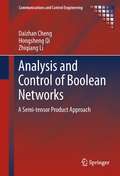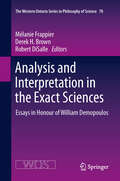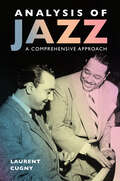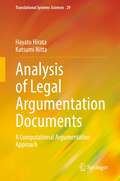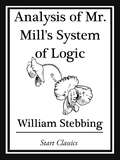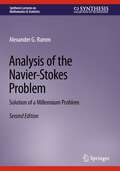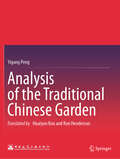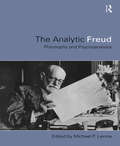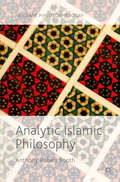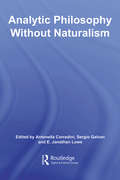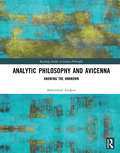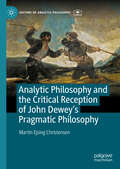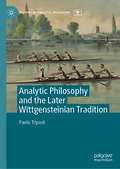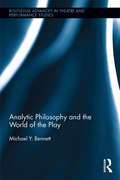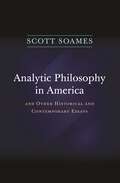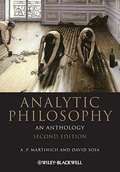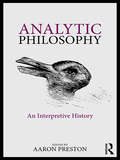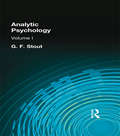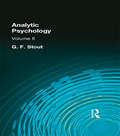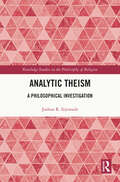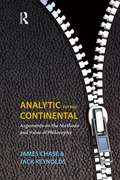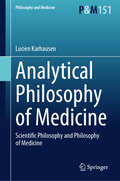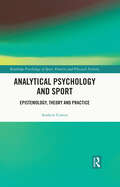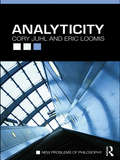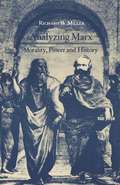- Table View
- List View
Analysis and Control of Boolean Networks: A Semi-tensor Product Approach (Communications and Control Engineering)
by Hongsheng Qi Daizhan Cheng Zhiqiang LiAnalysis and Control of Boolean Networks presents a systematic new approach to the investigation of Boolean control networks. The fundamental tool in this approach is a novel matrix product called the semi-tensor product (STP). Using the STP, a logical function can be expressed as a conventional discrete-time linear system. In the light of this linear expression, certain major issues concerning Boolean network topology - fixed points, cycles, transient times and basins of attractors - can be easily revealed by a set of formulae. This framework renders the state-space approach to dynamic control systems applicable to Boolean control networks. The bilinear-systemic representation of a Boolean control network makes it possible to investigate basic control problems including controllability, observability, stabilization, disturbance decoupling etc.
Analysis and Interpretation in the Exact Sciences: Essays in Honour of William Demopoulos (The Western Ontario Series in Philosophy of Science #78)
by Robert Disalle Melanie Frappier Derek BrownThe essays in this volume concern the points of intersection between analytic philosophy and the philosophy of the exact sciences. More precisely, it concern connections between knowledge in mathematics and the exact sciences, on the one hand, and the conceptual foundations of knowledge in general. Its guiding idea is that, in contemporary philosophy of science, there are profound problems of theoretical interpretation-- problems that transcend both the methodological concerns of general philosophy of science, and the technical concerns of philosophers of particular sciences. A fruitful approach to these problems combines the study of scientific detail with the kind of conceptual analysis that is characteristic of the modern analytic tradition. Such an approach is shared by these contributors: some primarily known as analytic philosophers, some as philosophers of science, but all deeply aware that the problems of analysis and interpretation link these fields together.
Analysis of Jazz: A Comprehensive Approach (American Made Music Series)
by Laurent CugnyAnalysis of Jazz: A Comprehensive Approach, originally published in French as Analyser le jazz, is available here in English for the first time. In this groundbreaking volume, Laurent Cugny examines and connects the theoretical and methodological processes that underlie all of jazz. Jazz in all its forms has been researched and analyzed by performers, scholars, and critics, and Analysis of Jazz is required reading for any serious study of jazz; but not just musicians and musicologists analyze jazz. All listeners are analysts to some extent. Listening is an active process; it may not involve questioning but it always involves remembering, comparing, and listening again. This book is for anyone who attentively listens to and wants to understand jazz. Divided into three parts, the book focuses on the work of jazz, analytical parameters, and analysis. In part one, Cugny aims at defining what a jazz work is precisely, offering suggestions based on the main features of definition and structure. Part two he dedicates to the analytical parameters of jazz in which a work is performed: harmony, rhythm, form, sound, and melody. Part three takes up the analysis of jazz itself, its history, issues of transcription, and the nature of improvised solos. In conclusion, Cugny addresses the issues of interpretation to reflect on the goals of analysis with regard to understanding the history of jazz and the different cultural backgrounds in which it takes place. Analysis of Jazz presents a detailed inventory of theoretical tools and issues necessary for understanding jazz.
Analysis of Legal Argumentation Documents: A Computational Argumentation Approach (Translational Systems Sciences #29)
by Katsumi Nitta Hayato HirataThis book introduces methods to analyze legal documents such as negotiation records and legal precedents, using computational argumentation theory.First, a method to automatically evaluate argumentation skills from the records of argumentation exercises is proposed. In law school, argumentation exercises are often conducted and many records of them are produced. From each utterance in the record, a pattern of “speech act +factor” is extracted, and argumentation skills are evaluated from the sequences of the patterns, using a scoring prediction model constructed by multiple regression analyses between the appearance pattern and the scoring results. The usefulness of this method is shown by applying it to the example case “the garbage house problem”. Second, a method of extracting factors (elements that characterize precedents and cases) and legal topoi from individual precedents and using them as the expression of precedents to analyze how the pattern of factors and legal topoi appearing in a group of precedents affects the judgment (plaintiff wins/defendant wins) is proposed. This method has been applied to a group of tax cases. Third, the logical structure of 70 labor cases is described in detail by using factors and a bipolar argumentation framework (BAF) and an (extended argumentation framework (EAF) together. BAF describes the logical structure between plaintiff and defendant, and EAF describes the decision of the judge. Incorporating the legal topoi into the EAF of computational argumentation theory, the strength of the analysis of precedents by combined use of factored BAF and EAF, not only which argument the judge adopted could be specified. It was also possible to determine what kind of value judgment was made and to verify the logic. The analysis methods in this book demonstrate the application of logic-based AI methods to the legal domain, and they contribute to the education and training of law school students in logical ways of argumentation.
Analysis of Mr. Mill's System of Logic
by William StebbingPhilosophical text written by William Stebbing, author of "Five Centuries of English Verse" and "Sir Walter Ralegh A Biography"
Analysis of the Navier-Stokes Problem: Solution of a Millennium Problem (Synthesis Lectures on Mathematics & Statistics)
by Alexander G. RammThis book revises and expands upon the prior edition, The Navier-Stokes Problem. The focus of this book is to provide a mathematical analysis of the Navier-Stokes Problem (NSP) in R^3 without boundaries. Before delving into analysis, the author begins by explaining the background and history of the Navier-Stokes Problem. This edition includes new analysis and an a priori estimate of the solution. The estimate proves the contradictory nature of the Navier-Stokes Problem. The author reaches the conclusion that the solution to the NSP with smooth and rapidly decaying data cannot exist for all positive times. By proving the NSP paradox, this book provides a solution to the millennium problem concerning the Navier-Stokes Equations and shows that they are physically and mathematically contradictive.
Analysis of the Traditional Chinese Garden
by Yigang PengAnalysis of the Traditional Chinese Garden is a seminal resource for the spatial principles and techniques that shape traditional Chinese gardens. It is a richly illustrated resource for historians, theorists, garden designers, landscape architects, architects and anyone interested in the design of these world renowned gardens with 106 pages of hand-drawn sketches by the author that vividly portray the intricacies and subtleties of traditional Chinese gardens. The book is widely known in China as a primary text for analysis of the gardens and was recognized with the inaugural National Excellent Architectural Book Award in 1990 and, since its debut in China in 1986, has garnered immense popularity and acclaim with 50 reprints and a total print run of 150,000 copies.
Analytic Freud: Philosophy and Psychoanalysis
by Michael P. LevineThis is a timely and stimulating collection of essays on the importance of Freudian thought for analytic philosophy, investigating its impact on mind, ethics, sexuality, religion and epistemology.Marking a clear departure from the long-standing debate over whether Freudian thought is scientific or not, The Analytic Freud expands the framework of philosophical inquiry, demonstrating how fertile and mutually enriching the relationship between philosophy and psychoanalysis can be.The essays are divided into four clear sections, addressing the implications of Freud for philosophy of mind, ethics, sexuality and civilisation. The authors discuss the problems psychoanalysis poses for contemporary philosophy as well as what philosophy can learn from Freud's legacy and undeniable influence. For instance, The Analytic Freud discusses the problems presented by pyschoanalytic theories of the mind for the philosophy of language; the issues which current theories of mind and meaning raise for psychoanalytic accounts of emotion, metaphor, the will and self-deception; the question whether psychoanalytic theory is essential in understanding sexuality, love, humour and the tensions which arise out of personal relationships.The Analytic Freud is a critical and thorough examination of Freudian and post-Freudian theory, adding a welcome and significant dimension to the debate between psychoanalysis and contemporary philosophy.
Analytic Islamic Philosophy (Palgrave Philosophy Today)
by Anthony Robert BoothThis book is an introduction to Islamic Philosophy, beginning with its Medieval inception, right through to its more contemporary incarnations. Using the language and conceptual apparatus of contemporary Anglo-American ‘Analytic’ philosophy, this book represents a novel and creative attempt to rejuvenate Islamic Philosophy for a modern audience. It adopts a ‘rational reconstructive’ approach to the history of philosophy by affording maximum hermeneutical priority to the strongest possible interpretation of a philosopher’s arguments while also paying attention to the historical context in which they worked. The central canonical figures of Medieval Islamic Philosophy – al-Kindi, al-Farabi, Avicenna, al-Ghazali, Averroes – are presented chronologically along with an introduction to the central themes of Islamic theology and the Greek philosophical tradition they inherited. The book then briefly introduces what the author collectively refers to as the ‘Pre-Modern’ figures including Suhrawardi, Mulla Sadra, and Ibn Taymiyyah, and presents all of these thinkers, along with their Medieval predecessors, as forerunners to the more modern incarnation of Islamic Philosophy: Political Islam.
Analytic Philosophy Without Naturalism (Routledge Studies in Twentieth-Century Philosophy)
by Antonella Corradini Sergio Galvan E. Jonathan LoweIn recent years numerous attempts have been made by analytic philosophers to naturalize various different domains of philosophical inquiry. All of these attempts have had the common goal of rendering these areas of philosophy amenable to empirical methods, with the intention of securing for them the supposedly objective status and broad intellectual appeal currently associated with such approaches. This volume brings together internationally recognised analytic philosophers, including Alvin Plantinga, Peter van Inwagen and Robert Audi, to question the project of naturalism. The articles investigate what it means to naturalize a domain of philosophical inquiry and look at how this applies to the various sub-disciplines of philosophy including epistemology, metaphysics and the philosophy of the mind. The issue of whether naturalism is desirable is raised and the contributors take seriously the possibility that excellent analytic philosophy can be undertaken without naturalization. Controversial and thought-provoking, Analytic Philosophy Without Naturalism examines interesting and contentious methodological issues in analytic philosophy and explores the connections between philosophy and science.
Analytic Philosophy and Avicenna: Knowing the Unknown (Routledge Studies in Islamic Philosophy)
by Mohammad AzadpurThis work engages in a constructive, yet subtle, dialogue with the nuanced accounts of sensory intentionality and empirical knowledge offered by the Islamic philosopher Avicenna. This discourse has two main objectives: (1) providing an interpretation of Avicenna’s epistemology that avoids reading him as a precursor to British empiricists or as a full-fledged emanatist and (2) bringing light to the importance of Avicenna’s account of experience to relevant contemporary Anglo-American discussions in epistemology and metaphysics. These two objectives are interconnected. Anglo-American philosophy provides the framework for a novel reading of Avicenna on knowledge and reality, and the latter, in turn, contributes to adjusting some aspects of the former. Advancing the Avicennian perspective on contemporary analytic discourse, this volume is a key resource for researchers and students interested in comparative and analytic epistemology and metaphysics as well as Islamic philosophy.
Analytic Philosophy and the Critical Reception of John Dewey’s Pragmatic Philosophy (History of Analytic Philosophy)
by Martin Ejsing ChristensenThis book examines the critical reception of Dewey&’s pragmatic philosophy by six prominent analytic philosophers and relates it to the contested history of analytic philosophy and Deweyan pragmatism. It argues that analytic philosophers&’ critical reception of Dewey&’s pragmatist philosophy has, from the very beginning, been marred by externalist readings that do not engage with Dewey&’s thinking from the inside, and suggests that this throws doubt upon the new revisionary histories of analytic philosophy and Deweyan pragmatism according to which the marginalization of Dewey&’s pragmatism represents the sensible result of critical processes of reasoning. At the same time, however, the book also points out that Dewey and his analytic critics in fact share several worries and suggests that these common concerns might serve as points of reference for more fruitful dialogues across the traditions of analytic philosophy and Deweyan pragmatism in the future.
Analytic Philosophy and the Later Wittgensteinian Tradition (History of Analytic Philosophy)
by Paolo TripodiThis book aims to explain the decline of the later Wittgensteinian tradition in analytic philosophy during the second half of the twentieth century. Throughout the 1950s, Oxford was the center of analytic philosophy and Wittgenstein – the later Wittgenstein – the most influential contemporary thinker within that philosophical tradition. Wittgenstein's methods and ideas were widely accepted, with everything seeming to point to the Wittgensteinian paradigm having a similar impact on the philosophical scenes of all English speaking countries. However, this was not to be the case. By the 1980s, albeit still important, Wittgenstein was considered as a somewhat marginal thinker. What occurred within the history of analytic philosophy to produce such a decline? This book expertly traces the early reception of Wittgenstein in the United States, the shift in the humanities to a tradition rooted in the natural sciences, and the economic crisis of the mid-1970s, to reveal the factors that contributed to the eventual hostility towards the later Wittgensteinian tradition.
Analytic Philosophy and the World of the Play (Routledge Advances in Theatre & Performance Studies)
by Michael Y. BennettTheatrical characters’ dual existence on stage and in text presents a unique, challenging case for the analytical philosopher. Analytic Philosophy and the World of the Play re-examines the ontological status of theatre and its fictional objects through the "possible worlds" thesis, arguing that theatre is not a mirror of our world, but a re-creation of it. Taking a fresh look at theatre’s key elements, including the hotly contested relationships between character and actor; onstage and offstage "worlds"; and the play-text and performance, Michael Y. Bennett presents a radical new way of understanding the world of the play.
Analytic Philosophy in America: And Other Historical and Contemporary Essays
by Scott SoamesIn this collection of recent and unpublished essays, leading analytic philosopher Scott Soames traces milestones in his field from its beginnings in Britain and Germany in the late nineteenth and early twentieth century, through its subsequent growth in the United States, up to its present as the world's most vigorous philosophical tradition. The central essay chronicles how analytic philosophy developed in the United States out of American pragmatism, the impact of European visitors and immigrants, the midcentury transformation of the Harvard philosophy department, and the rapid spread of the analytic approach that followed. Another essay explains the methodology guiding analytic philosophy, from the logicism of Frege and Russell through Wittgenstein's linguistic turn and Carnap's vision of replacing metaphysics with philosophy of science. Further essays review advances in logic and the philosophy of mathematics that laid the foundation for a rigorous, scientific study of language, meaning, and information. Other essays discuss W.V.O. Quine, David K. Lewis, Saul Kripke, the Frege-Russell analysis of quantification, Russell's attempt to eliminate sets with his "no class theory," and the Quine-Carnap dispute over meaning and ontology. The collection then turns to topics at the frontier of philosophy of language. The final essays, combining philosophy of language and law, advance a sophisticated originalist theory of interpretation and apply it to U.S. constitutional rulings about due process.
Analytic Philosophy: An Anthology
by A. P. Martinich David SosaFeaturing updates and the inclusion of nine new chapters, Analytic Philosophy: An Anthology, 2nd Edition offers a comprehensive and authoritative collection of the most influential readings in analytic philosophy written over the past hundred years. Features broad coverage of analytic philosophy, including such topics as ethics, methodology, and freedom and personal identity Focuses on classic or seminal articles that were especially influential or significant New articles in this edition include Proof of an External World by G. E. Moore, Criteria, Defeasibility, and Knowledge by John McDowell, Sensations and Brain Processes by J. J. C. Smart, selections from Sense and Sensibilia by J. L. Austin, Other Bodies by Tyler Burge, Individualism and Supervenience by Jerry Fodor, Responsibility and Avoidability by Roderick Chisholm, Alternative Possibilities and Moral Responsibility by Harry Frankfurt, and Personal Identity by Derek Parfit Offers diverse approaches to analytic philosophy by including readings from Austin, Wittgenstein, Quine, and Davidson
Analytic Philosophy: An Interpretive History
by Aaron PrestonAnalytic Philosophy: An Interpretive History explores the ways interpretation (of key figures, factions, texts, etc.) shaped the analytic tradition, from Frege to Dummet. It offers readers 17 chapters, written especially for this volume by an international cast of leading scholars. Some chapters are devoted to large, thematic issues like the relationship between analytic philosophy and other philosophical traditions such as British Idealism and phenomenology, while other chapters are tied to more fine-grained topics or to individual philosophers, like Moore and Russell on philosophical method or the history of interpretations of Wittgenstein’s Tractatus. Throughout, the focus is on interpretations that are crucial to the origin, development, and persistence of the analytic tradition. The result is a more fully formed and philosophically satisfying portrait of analytic philosophy.
Analytic Psychology: Volume I
by G. F. StoutFirst published in 2002. Routledge is an imprint of Taylor & Francis, an informa company.
Analytic Psychology: Volume II
by G. F. StoutFirst published in 2002. Routledge is an imprint of Taylor & Francis, an informa company.
Analytic Theism: A Philosophical Investigation (Routledge Studies in the Philosophy of Religion)
by Joshua R. SijuwadeThis book explores and develops a new philosophical argument for the existence of God from metaphysics. It focuses on exploring the pressing questions of God’s existence, the truth of theistic belief, and its relevance in modern philosophy. In doing so, it bridges the discussions and debates in the field of contemporary metaphysics with that of analytic philosophy of religion.At its core, metaphysics is dedicated to unveiling the fundamental structure of reality, playing a critical role in any intellectual endeavour in the quest for truth. However, a noticeable gap has persisted between today’s metaphysical conversations and the debates in analytic philosophy of religion, especially regarding the topic of God’s existence. In this book, the author embarks on a rigorous exploration, presenting an innovative a posteriori argument for theism, rooted in the latest evidence and theories from contemporary metaphysics. The first part of the book details the explanatory framework of the analysis, which is focused on introducing a new abductive methodology within metaphysics that provides a way for assessing the veracity of theism and the leading fundamental theories in contemporary metaphysics. The second part of the book then focuses on demonstrating how the central concepts and theories within contemporary metaphysics—such as quantum foundations, four-dimensionalism, formal ontology, essentialism, grounding, powerful causation, mereology, free will, personhood, and the reality of suffering—are best explained by the existence of God, and thus justify theism, over that of the competing theories within contemporary metaphysics. Theism is thus the best working metaphysical theory and should take a central place in fundamental enquiries within the field of contemporary metaphysics and beyond.Analytic Theism: A Philosophical Investigation is a must-read for scholars and advanced students venturing into philosophy of religion and metaphysics. Beyond its appeal to those in analytic philosophy of religion and metaphysics, this work also resonates with those immersed in contemporary philosophy on a whole and related fields of inquiry, serving as a pivotal read for anyone keen on the intersections of philosophy, theology, and science.
Analytic Versus Continental: Arguments on the Methods and Value of Philosophy
by James Chase Jack ReynoldsThroughout much of the twentieth century, the relationship between analytic and continental philosophy has been one of disinterest, caution or hostility. Recent debates in philosophy have highlighted some of the similarities between the two approaches and even envisaged a post-continental and post-analytic philosophy. Opening with a history of key encounters between philosophers of opposing camps since the late nineteenth century - from Frege and Husserl to Derrida and Searle - the book goes on to explore in detail the main methodological differences between the two approaches. This covers a very wide range of topics, from issues of style and clarity of exposition to formal methods arising from logic and probability theory. The final section of this book presents a balanced critique of the two schools' approaches to key issues such as time, truth, subjectivity, mind and body, language and meaning, and ethics. "Analytic versus Continental" is the first sustained analysis of both approaches to philosophy, examining the limits and possibilities of each. It provides a clear overview of a much-disputed history and, in highlighting the strengths and weaknesses of both traditions, also offers future directions for both continental and analytic philosophy.
Analytical Philosophy of Medicine: Scientific Philosophy and Philosophy of Medicine (Philosophy and Medicine #151)
by Lucien KarhausenThis book describes the philosophy of medicine as a subset of the philosophy of science. It is grounded in an epistemological bottom-up account that arises from the clinical situation, the epidemiologic and the resulting public health account. The volume offers a set of coherent beliefs that are deductively closed, which means that any statement which is logically entailed by the theory belongs to the theory. Medicine does not originate, as usually admitted, with the notion of disease inasmuch as concepts of disease, malfunction or health are evolved, sophisticated and advanced constructs. Medical norms, i.e., pathological features, are logically and conceptually prior to normal features. Following Ludwig Wittgenstein, by analogy with the way members of a family resemble each other, diseases are often what Ludwig Wittgenstein called “family-resemblance concepts”, which manifest a similarity shared by things classified into certain groups in the way members of a family resemble each other: each shares characteristics which many but not all the others, and there are no necessary or sufficient conditions for belonging in that classification. This book analyses the confusions associated with the concept of health, and subsequently turns to medical interventions, preventive, therapeutic and palliative as well as to the caring relationship, patients’ autonomy, doctors’ authority, and paternalism. Finally, the epistemic, ethical, or ontological limits of medicine, are being discussed, and the final account leaves us at the end of the scale with the perspective afforded by the patient facing suffering, impairment, death and tragedy, not to mention the physician’s predicament, which give rise to the principle that undergirds them all, i.e., the value of life.
Analytical Psychology and Sport: Epistemology, Theory and Practice (Routledge Psychology of Sport, Exercise and Physical Activity)
by Andrew CowenAnalytical Psychology and Sport: Epistemology, Theory and Practice introduces the epistemology and psychology of C.G. Jung to the sport psychology readership. In doing so, it considers for the first time the implications of analytical psychology with respect to theorising on well-established psychological phenomena in sport, including confidence, mental toughness and psychological momentum. To date, sport psychology has given limited consideration to how epistemology itself informs the development of knowledge. In light of Jung’s epistemological contributions and more recent developments in psychology, this new book explores how a renewed focus on the philosophy of science can help facilitate the development of sport psychology as a scientific discipline. This new research volume investigates analytical psychology in relation to a number of novel topics, including person–athlete interdependence and the psychology of performance variation, and will be key reading for academics and students of sport and exercise psychology, analytical psychology and related disciplines.
Analyticity (New Problems of Philosophy)
by Cory Juhl Eric LoomisAnalyticity, or the 'analytic/synthetic' distinction is one of the most important and controversial problems in contemporary philosophy. It is also essential to understanding many developments in logic, philosophy of language, epistemology and metaphysics. In this outstanding introduction to analyticity Cory Juhl and Eric Loomis cover the following key topics: The origins of analyticity in the philosophy of Hume and Kant Carnap's arguments concerning analyticity in the early twentieth century Quine's famous objections to analyticity in his classic 'Two Dogmas of Empiricism' essay The relationship between analyticity and central issues in metaphysics, such as ontology The relationship between analyticity and epistemology Analyticity in the context of the current debates in philosophy, including mathematics and ontology Throughout the book the authors show how many philosophical controversies hinge on the problem of analyticity. Additional features include chapter summaries, annotated further reading and a glossary of technical terms making the book ideal to those coming to the problem for the first time.
Analyzing Marx: Morality, Power and History
by Richard W. MillerIn this book Marx is revealed as a powerful contributor to the debates that now dominate philosophy and political theory. Using the techniques of analytic philosophy to unite Marx's general statements with his practice as historian and activist, Richard W. Miller derives important arguments about the rational basis of morality, the nature of power, and the logic of testing and explanation. The book also makes Marx's theory of change useful for current social science, by replacing economic determinist readings with a new interpretation in which systems of power relations are the basis of change. Part One discusses Marx's criticisms of the moral point of view as a basis for social choice. The outlook that emerges is humane but antimoral. Part Two argues that Marx's concept of the ruling class is a means, of measuring political power that is ignored yet urgently needed by present-day social science. Part Three bases Marx's theory of history on the dynamics of power, challenging both the standard, economic determinist readings of the theory and standard conceptions of science.
